 |
 |
 |
 |
 |
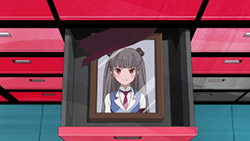 |
 |
 |
 |
 |
 |
 |
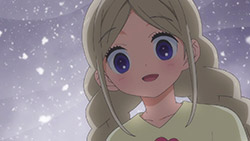 |
 |
 |
 |
 |
 |
 |
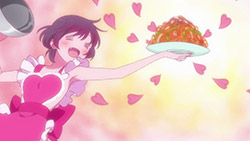 |
 |
 |
 |
 |
 |
 |
 |
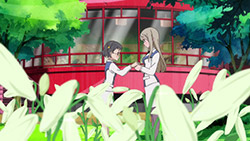 |
 |
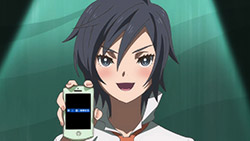 |
 |
 |
 |
 |
 |
 |
“I Want To Have You All To Myself”11 Years Ago: After last week’s episode focusing on the backstory of Lulu, I predicted that this time we might get an episode focusing on Ginko and her past. And that’s what got… for the most part. We certainly got a spotlight shone on Ginko, for which I am grateful, and shed more light on how she and Kureha are linked in the current story. As it turns out, 11 years ago, 5 year old Kureha found Ginko’s chibi bear body in the aftermath of a battle. By the looks of it there was definitely some intense war going on at this time, and I liked that shift into something more serious and touching as opposed to the silliness and sexiness that Yuri Kuma Arashi embraces at every opportunity. Unless I missed some details, there was no confirmation whether Ginko was the one who ended up killing Kureha’s mother. The more I think about the more I wonder if she really might be the killer, especially once the ever-troubling Yuriiika is factored in. Still, Ginko actively labels herself as a Criminal-Bear, so there must be some reason behind that title, which will hopefully get explained at some point. Ginko’s Hallucinations: It’s quite cute how much Ginko loves Kureha. Now that we know how they first met it’s easier to hope they manage to get together despite the odds. Ginko’s occasional hallucinations were quite amusing, even more so when it cut back to reality and we saw just how Kureha is not down for any of this. It’s a difficult situation because although I’m rooting for Kureha and hope that justice is served, I think there is more to Ginko and Lulu’s characters than we were initially led to believe, so I hope they get involved as a trio sooner rather than later. Friendship: Ginko may love Kureha but she and Lulu can’t even make friends with her. Kureha herself points out that people shouldn’t be friends with her after her classmates declaring her ‘evil’. I did that was very harsh when it happened, but it was even worse seeing Harishima Kaoru (Hikasa Yoko) successfully fool Kureha into believing that she and the other girls really wanted to be her friends. It’s sad, and thank god Ginko and Lulu stepped in when they did… though now they’re caught in a sticky situation themselves. Who said making friends was easy? Overview – What’s Next? First thing’s first, there is no way that Ginko is dead after that. I said I wasn’t sure about Mitsuko’s ‘death’ either, but that we seemed to be oddly confirmed (or shelved for later), but it’s hard to tell. All in all, a fairly simple episode with a lot of the details still too nonsensical to paint the complete picture, and I wouldn’t expect any different. I’d also like to see more of what went down 11 years ago, from the point of view of various characters. There’s some seriously interesting stuff going on here, it’ll just take time to see where this is heading. |
|
Information Digest:Synopsis:
Previously:
Details Digest:Suspicious Sensei:
|

Oh great!
I think mitsuko is alive. Who else would have told the invisible storm that ginko and lulu are bears disguised as humans?
Shocking truth! It’s a trap!
and unusually enough for anime its a literal trap!
https://randomc.net/image/Yuri%20Kuma%20Arashi/Yuri%20Kuma%20Arashi%20-%2005%20-%20Large%2017.jpg
Ginko is yuri. Ginko is love. Ginko is life.
https://randomc.net/image/Yuri%20Kuma%20Arashi/Yuri%20Kuma%20Arashi%20-%2005%20-%20Large%2018.jpg
Double hadaka apron… No make that triple hadaka apron… I’m loosing blood man
https://randomc.net/image/Yuri%20Kuma%20Arashi/Yuri%20Kuma%20Arashi%20-%2005%20-%20Large%2036.jpg
And shall we try not to loose our heads on this?
Naked apron needed a transfusion.
So cute I might just let them eat me.
I am worried for Ginko.
Homophobia is the wrong word for the situation of views on gays in Japan in a way similar to how racism does not accuracy portray the Japanese view of non Japanese even though non Japanese face discrimination and bigotry in Japan until they meet the acceptance standard.
Homophobia is fear of the gay with the whole religious condemnation and efforts to wipe out gay sex totally. In Japan is goes into the what you are expected to act like in public to what everyone thinks is ok in private. In effect the Japanese expect everyone to comply with a fake facade of behavior in public but expect different actions in private. In example straight married couples are expected to act monogamous in public with no public shows of affection but everyone expects that both sexes will take lovers and engage if they wish in group and other forms of kinky sex in love hotels and clubs. Thus western gays even moved to Japan several decades back before gay liberation in the west as the Japanese were fine with gay sex just as long as you conformed with the public facade that everyone is expected to comply with.
Of course gays just like feminists are now chaffing against having to live the public life they are assigned and I don’t blame them. Females have it worst as the culture holds back their advancement in business and public role in society where male gays are fine as long as they don’t advertise the fact they are gay (there is an exception where cross dressing Queens actually can be publicly gay and not face discrimination and this goes back centuries) In this story the Invisible storm where females are gay but expecting themselves and others to act straight in public.
I like to know how a girl who does not conform to the dress code manages to head up the social conform faction.
Your thoughts are very interesting, much enjoyed reading them and agreed for the most part. I would however say that when it comes to homophobia and racism in Japan, I would think they definitely do exist.
Homophobia means less of ‘fearing gay people’ (though it still could) than it is just opposing, discriminating, or hating them, and I don’t think Japan should be exempt for that. Similar to what you say though, their cultural lens is different (as is their history) so even if their homophobia/racism/sexism isn’t the same as the other side of the world, it’s still what it is. My general impression of Japanese homophobia seems to be less actively hateful but more based on lack of understanding, ie that gay men are really women trapped in a man’s body, or that lesbians will grow up to have a husband and a family. I’ve never heard many hate crimes reported from Japan, but at the same time there doesn’t seem to be much of a push to change laws regarding discrimination. But those really simplified misunderstandings do often make for offensive stereotypes in anime/manga, so whenever I see an LGBT character treated like a real person and not just a running gag, it’s a relief.
Ikuhara does tie that in pretty well with YKA but I’m not sure if he will ever explicitly state that is what he’s going for. Still, it’s an interesting discussion and even if it has the occasional fanservice scene behind it, it still feels like he’s trying to say something.